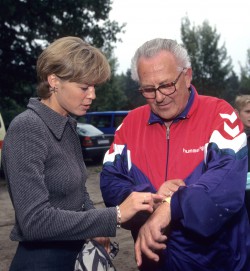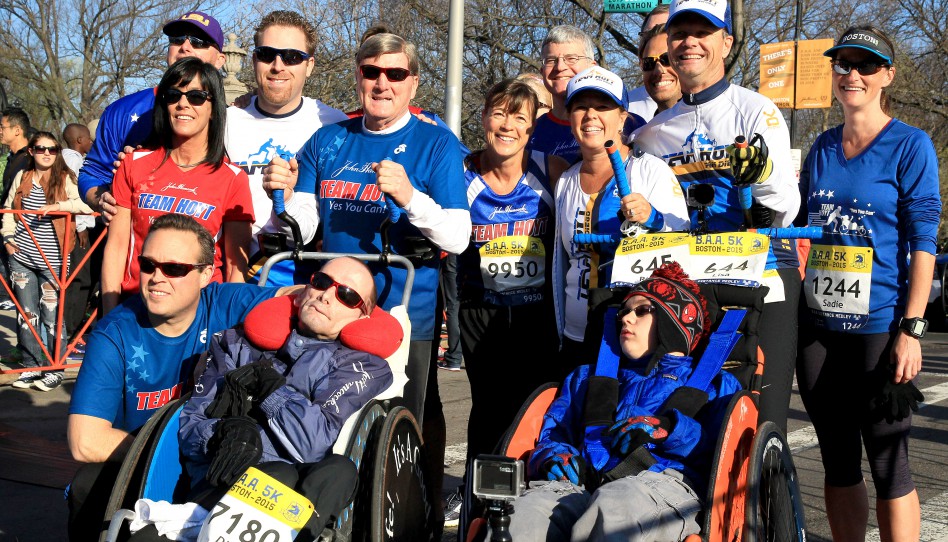The Marathon of Life
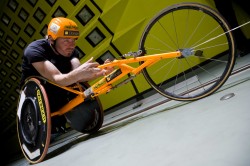
Thomas Geierspichler is an extraordinary athlete: European Champion, multiple world record holder, World Champion—and paralyzed. In 2004 the Austrian won five medals at the Paralympics in Sydney and Athens—including a gold for the 1,500 meters. Last year he crowned his career with a win in world record time at the Paralympic marathon in Beijing. Just as impressive as his victories is the way the 32-year old came to terms with his fate after a 1994 car accident left him wheelchair bound at the age of 18. For three desperate years he tried to escape his new reality through a haze of drug and alcohol abuse. Then with courage and determination, he faced his own reality and did something about it. He started exercising and three years later he won a bronze medal at the Sydney Marathon. Thomas Geierspichler talks about his inspiring journey, his belief, finding happiness, and what the marathon means to him in this interview with Take The Magic Step® writer Piet Könnicke.
You have been called an Ambassador and inspiration for athletes with a physical disability. So what is your message?
Thomas: One of my basic principles is: Everything is possible for those who believe. Just never give up, continuously work towards your goal, don’t lose sight of it and always look ahead, no matter how bad things might be. If you don’t get caught up worrying and complaining about the circumstances even in hopeless situations, you can achieve everything. To me, this is an essential attitude in life. As for being called an ambassador, actually I don’t really aim for that, but in a way it is forced onto me. This is why I try to give my best as I think that we should take advantage of athletes with a physical disability finally being in the public eye.
You yourself had to work hard to be able to live by this principle after your car accident and struggles with alcohol, drugs and depressions. How did you get onto the right track?
Thomas: My father was seriously ill at that time and I noticed that I was approaching a dead end street. I was staying with friends who are very religious and who prayed for me. It was like speeding on a highway and all of a sudden there is a stop sign. I told myself: If there really is justice and if God exists, I’ll put it to a test now. Then they’ll help me change and quit the drugs and alcohol. So I drove home and decided to stop all this crap. From then on it all got better and I felt increasingly energized. I read a lot in the bible and told myself: Now you do it like Jesus. I fasted for 40 days, only ate soup and drank tea. During this time, I experienced a tremendous healing process within me. I cried a lot, more and more came out of me—everything that I had suppressed with drugs and alcohol for years. I increasingly looked at myself and was able to see myself as others did. That was the turning point: I had to face reality and had to accept the situation as it was. When you are able to do this, you get to the true foundation of truth and get real with yourself. And then you see your own way—the one determined just for you—through dreams, visions or through what your heart tells you.
What did you dream of, what did your heart wish for?
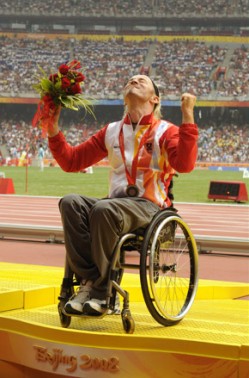
Thomas: I saw Hermann Maier win two Olympic races after a serious fall at the 1998 Winter Olympic Games in Nagano and I realized: I want the national anthem to be played for me one day. When I saw the Olympic Games as a child I always got goose bumps and never knew why. And then suddenly, through my belief and the experience of Nagano I knew what it meant when I got goose bumps and when I had tears in my eyes. I have always been sporty and loved sports.
The first exercises you started off with were push-ups. What did that feel like?
Thomas: All the energy that I felt, all of a sudden, I wanted to put into action. I finally felt myself again. Finally I could physically feel what I had just experienced mentally before. I started to feel physically complete again. And from then on things started to get better.
Does the sport give something back to you that you had lost?
Thomas: If it had been my biggest wish to do photography or to paint, if I had discovered my talent for arts and if that had been my destiny, then this would have given something back to me. Actually, the only thing the sport does to me is that it has helped to find what I am destined for and that I feel integrated in life again. My basic principle, however, is the belief, not the sport. My belief is what helps me encourage other people to find their way in life and follow it. Your heart tells you where you belong.
You once said that you had overcome your handicap. What makes you feel like that?
Thomas: I had overcome it the moment I accepted myself the way I am. And after I had won my first gold medal in Athens, it was like the cycle had been completed: that was the moment I had completely come to terms with my life and my being in a wheelchair. The fact that I am in a wheelchair is of course always present but it does not weigh me down anymore. I can push it aside like a light air balloon. And I can let it come closer and look at it from all angles and in all areas of life objectively without it burdening me.
Did you think of running a marathon before the car accident?
Thomas: No, not really. The desire to do so only came later.
For many runners, the marathon is the ultimate challenge. What does the marathon mean to you?
Thomas: I consider the marathon to be a model of my life. It is not only a physical challenge for which you have to gather all your strength, but it requires all your physical and mental resources. You have to overcome several inner obstacles and go beyond your own limits with the help of a strong mental attitude. In a marathon—no matter if you have trained for months or for years—two or three times you reach a point at which you say: “No, I don’t want this anymore. I don’t care what I promised before or what I had wanted to achieve, I don’t care who is watching. I am exhausted, I just want to lie down and sleep.” To then look ahead, to throw the anchor ahead so to speak and get yourself out of this hole and to keep on going—to experience this moment makes me so incredibly happy. That gives you strength for life. And before that, life had taught me to overcome difficulties, alcohol and drugs. That strengthened me mentally and made me a successful marathon runner. In a marathon you experience something that can also happen to you in your normal life, but in a very compressed way and therefore a much more intense way. You experience setbacks and still keep on going. It gets at you—physically and psychologically.
Please describe your favorite training session. What do you like doing particularly?
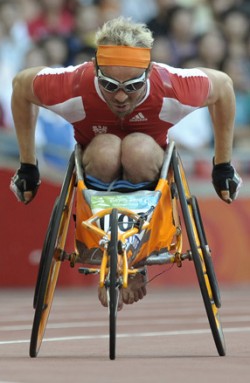
Thomas: I complete ten to twelve training sessions a week, four to six hours a day. I really like the following program: half an hour warm up, 10 minutes interval of solid speed endurance—5 minutes relaxed ride—10 minutes interval—5 minutes relaxed—10 minutes interval—5 minutes relaxed. Then 5 minutes at a higher speed—5 minutes relaxed—5 minutes of speed. And then 2 x 2 minutes at the highest speed possible. You really feel yourself and it is amazing to go beyond your limit. And if you then manage to get up again and go for another easy one-half hour cool-down ride, it has been a successful day.
What do you do when you don’t feel like training?
Thomas: I just do it. I never skipped training because I didn’t feel like it. And I don’t even want to start thinking about skipping it, otherwise you quickly reach the point that you skip it again the next time you feel like that.
After you won The Beijing Marathon, you were besieged by the press. You were honored as Austria’s Paralympic Athlete 2008 and were all over TV. Obviously your training schedule was disrupted. Did you miss the structure of your training?
Thomas: I ran the Beijing Marathon on September 17. Then I took advantage of the beautiful autumn days until November to stay fit and maintain my endurance a little. I just had to do a lot of things and I was so busy that I wouldn’t have been able to train twice a day. To me, however, it was very important to represent athletes with a physical disability in the public. I saw this as an investment in the future. And my training will pick up again in January.
Do you need support during your training, someone to accompany or motivate you?
Thomas: Only for my interval training really. Then it is good to have someone telling you if you are doing well or if you are one or two seconds too slow. Otherwise I like being on my own, it clears my mind during a long training session.
What do you think you will do when you stop competing?
Thomas: I just wait and see. When the time has come at which I cannot go on like this anymore, the next step will happen naturally. I don’t worry about this. I think at that point I will have a new idea—maybe in a completely new direction. But until this point of time has been reached, it’ll just go on as it is. At this stage, I have no desire whatsoever to look for new visions and goals as they will come from my heart automatically anyhow. We founded a club—Walk’n‘roll—which enables us to support needy people with a physical disability, in sports or in other areas of life. If these people reach their goals through our help, they will spread the spirit and encourage other people. This is what I want to keep doing in the future; this is my mission.
You say that you were very lucky in life. For some people who know your story, this seems hard to believe. How do you explain this to them?
Thomas: It may seem hard to believe for many that a paraplegic could say: I love my life and have only been lucky! But it is simply that I have set goals for myself and have reached them all. These feelings of happiness that I often have—when I won in Beijing or when I look into the people’s faces at my motivational speeches—fill me with satisfaction. Then I can feel the energy flow. My life is absolutely perfect—it just all falls into its place: I have a great apartment; I have started to work on a lot of things and have achieved a lot. And I really value that highly. I am not perfect and certainly make a lot mistakes but in contrast to former times, I live and experience my life consciously now and follow what I am destined for. And this, I think, is true happiness.
- Posted January 28, 2009
© Copyright 2009-2022 by Take The Magic Step®. All Rights Reserved.
